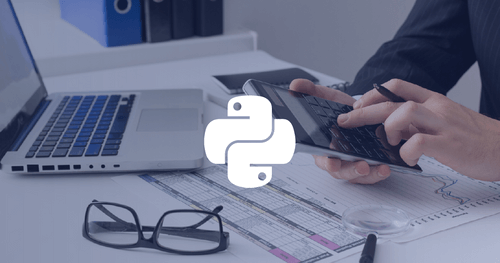Fintech is one of the hottest startup niches that attracts millions of funding dollars and has brought some of the most impressive unicorns all over the world. However, fintech solutions are usually very complex and often have to meet certain security and compliance standards. Fintech startups have to deal with state-level regulations, national regulations, integrations with various services and institutions, and banking API connections.
For fintech companies, capturing the attraction and trust of their end-users is just one part of the equation. What they need is the highest level of security, outstanding functionality, and compliance.
This is why so many fintech startups choose Python as the foundation of their technology stacks. This highly popular programming language allows building unique software that delivers value to users and is bound to stay relevant for a very long time. Python powered many successful fintech products - from digital payment solutions like Stripe and financial analytics software like Kensho to entire banking platforms (think Revolut) and stock marketplaces like Robinhood.
Keep on reading to find out why Python makes such great technology for fintech products and why so many fintech success stories were enabled by this powerful programming language.
Table of contents:
- Finance and Python: why is it such a great combination?
- Using Python in finance - examples
- Python in finance - wrap up
Finance and Python: why is it such a great combination?
Python has become a go-to technology perfect for startups and financial services enterprises experimenting with new technologies. Below are the most important factors that contribute to the growth of Python in this sector.
Python accelerates development for faster time to market
Using Python in combination with frameworks like Django, you can build an MVP really fast to increase the chances of finding your startup's product-market fit. Fast time to market is essential because it enables a company to compete or collaborate with banking institutions.
It's essential that you can adapt to the changes in customer demands, offer extra services and improvements, and constantly grow your product. That's why your technology stack needs to allow this flexibility and provide your team with a solid foundation for adding numerous extra services.
Python is a great choice for building an MVP. It helps to avoid losing time on building things that are part of practically every financial services application, like authorization or user management from scratch. You can simply take whatever you need from the vast ecosystem of libraries and create your MVP.
Python is great for any mathematical functions
The finance industry couldn't exist without mathematicians and economists using statistical methods, creating algorithms and formulas. Languages like R and Matlab used for such purposes are less common and more complex than Python.
That's why Python became the go-to technology for finance and the programming lingua franca of data science. Economists use Python to make their calculations today, so a piece of software developed in Python will be much easier to integrate with their insights.
Python works well in AI and machine learning
The financial industry generates massive volumes of data. Many banks and startups capitalize on these datasets to develop algorithms and statistical models for making predictions based on the continuously received stream of new data.
AI and machine learning are commonly found in fintech products in areas like cybersecurity (for instance, fraud detection), personal finance, customer service, risk management, automated trading, and more.
Python is an excellent language for machine learning projects thanks to its readable code, high speed of execution, a rich ecosystem of specialized libraries, and extremely supportive community.
Python is a secure and mature technology
In an industry like financial services, every piece of software needs to meet strict demands around architecture, quality, and security. Moreover, it needs to comply with international and local laws and regulations. Finally, in order to gain the trust of its users, a fintech product needs to provide a reliable and trustworthy experience.
Python was first released in 1991. Over the last 30 years, developers have been working hard to gradually improve and optimize it. So, we're not lying when we say that Python is a mature technology. There are many developers that worked with Python for years and know exactly what challenges it poses. Understanding the weak points of the software and fixing them before they snowball into a problem is one of the benefits coming from that experience.
In financial services, you only get one chance to build an app that is both secure and safe to use. If a user loses money because of a bug in your system, your reputation will be forever tarnished, and rebuilding it is going to be very hard (or even impossible).
Imagine that a person loses money because something goes wrong in your system. Why would they go back to you when there are so many alternatives? When using Python in financial products, you mitigate the risk of security issues because it's a mature technology supported by a vast group of developers who are ready to fix any issue.
Python is perfect for carrying out complex operations on large amounts of data
Python comes with a rich academic background since it serves as a common technology for many scientists and researchers across all domains (not only computer science). Thanks to Python's human-readable syntax, it's great for performing complex calculations that involve a lot of data.
Just consider that Python is today the main language for the majority of machine learning and AI developers. You can be sure that they deal with massive volumes of data. Python comes with a great ecosystem of packages and libraries made for data processing and computations with Big Data specifically.
Simpler syntax means easier collaboration
Thanks to its easy-to-understand syntax, Python can be read and understood by practically everyone. As a high-level language, Python is all about code readability. It allows programmers to express concepts within a few lines of code. So, Python isn't only understandable to technical specialists but clients as well. Different product stakeholders with different levels of technical understanding can understand it and, as a result, engineers find explaining the code easier.
Python comes with a rich ecosystem of libraries and packages
The language is surrounded by an incredibly productive open-source developer community that contributed more than 140k custom-built software packages that cover everything from machine learning and game development to astronomy and Big Data operations.
Developers can insert them into any Python program within just a few seconds. Python also offers tools for API integration. This means the developers don't have to build tools from scratch and create a product that processes large amounts of data fast. This can save you a lot of time and money if you're building an MVP.
Python has all the integrations
Thanks to Python libraries and packages, you can integrate your product with other systems through different APIs easily. In financial services, APIs are used to collect and analyze the data organizations need about users, organizations, real estate, and many other things. For example, in the UK, people's credit history is available via an API. This data might be required in order to proceed with certain financial operations, so your application needs to include an easy way to integrate with such APIs. This is what you get in Python.
Python is incredibly popular
And his popularity is only growing. In the Stack Overflow Developer Survey 2021, Python ranked as:
- The 3rd most popular language,
- The 6th most loved language,
- The 1st among the most wanted programming languages.
Python is surrounded by an incredibly large community of passionate developers who are ready to help others solve problems. Thanks to the vast and diverse user base, the chances that the solution to your problem can be found in the documentation are pretty high.
Python's popularity also means that sourcing specialists from the market will be easier – whether it's a junior, mid-level, or senior Python expert.
Using Python in finance - examples
Analytics tools
Python finds a lot of use in quantitative finance products. These are solutions that process and analyze large data sets. Libraries like Pandas help to simplify such processing and help to visualize data. Powerful machine learning algorithms that are part of such libraries enable all kinds of predictive analytics functions and come in handy to practically all financial services providers.
Banking software
Financial institutions and hedge funds build payment solutions and online banking platforms using Python as well. For example, Venmo grew from a payment tool into an incredible social network. The language is flexible and simple, so it's a great pick for developing ATM software that boosts payment processing.
Stock trading apps
Stock markets generate a lot of stock data, so it's only natural that Python helps here as well. Developers use it to build web solutions that identify the best stock trading strategies, carry out data analysis, and offer actionable and predictive analytical insights into the condition of particular markets or organizations. Examples of such products are Zipline or Quantopian.
Python for finance - wrap up
As you can see, Python is an incredibly valuable technology for any kind of financial services product – from an enterprise Proof of Concept to a startup MVP.
Are you building a fintech product right now? If so, are you planning to use Python? If you need some extra Python talent on board, reach out to us – our Python specialists have experience in developing successful digital products for the financial services sector.


